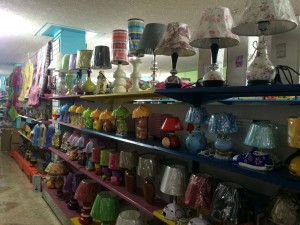In a new project, I trace the fortunes of three interrelated communities across four northern Andean cities. Indigenous Otavaleño traders, mestizo apparel producers in the manufacturing cluster of Atuntaqui, and the Chinese diasporic community of Ibarra and Tulcan found their economic fortunes bound together in the 2000s.

Since 2009, Chinese-made products have swung from being the pure, free-wheeling, cheap global commodity to political pawn. By following the risky livelihoods of those who earn from Chinese-made sweaters, jackets, shoes, and casual wear, I spell out two critical lessons about Ecuador’s post-neoliberal development. First, the trade in Chinese goods clarifies how much global trade still drives change, right down to artisanal enterprises.

The second lesson concerns the consequences of the state’s forceful yet temporary market interventions. In 2009 and again in 2015, the state has introduced steep but temporary tariffs. Such breaks are caustic for the social ties among different north Andean trading communities: Chinese, indigenous Otavaleño, Spanish-speaking mestizo, and cross-border Colombian. Here, cultural institutions are essential both for credit and for business tactics. Yet the macro-economic reversals undo personal-economic accommodations.
I found this out from an Otavaleño couple trying to recover from an economic disaster. When a long time client from Colombia failed to pay for $50,000 of products José and Mercedes and sold him, they lost all their savings. They had no choice but to start from scratch with the most affordable product they could sell—simple fleece blankets made of Chinese material. It is here that the lack of rapport with his Chinese suppliers had begun to anger José in 2015, more than fifteen years since he had started to work with them. The issue was not credit. He said that the problem was a lack of courtesy.
“They are half angry with you all the time. You have to buy from them so you put up with it. You come in make your purchase and get out,” José said. They would not engage in the kind of bargaining that José does with his Ecuadorian suppliers. Such negotiating is partially about price. In the give and take with his suppliers, though, he angles for something more. Seeking exclusive merchandise that might complement his distinctive style, he wanted to customize a transaction.
For a Peruvian Chinese businessman who operated out of Ibarra, José’s anger indicates a misunderstanding of Chinese business habits. And this misperception, in turn, reveals the current limitations that Ecuador faces in its relations with China and the world economy. In his account, An Otavaleño’s inability to get the goods he needs is not an artifact of cultural misunderstanding. Nor is it a Chinese unwillingness to bargain. It is rather the insularity of Ecuador as a whole, the narrowness of its economy and its president’s vision.
As an illustration, he explained that he always expects to bargain. He picked up a shiny, golden, plastic waving cat. “When I get these, I mark the price up 500 percent. In Peru, someone comes in and says, ‘If I take 500, what is my price?’ I then give them a discount. But the man stays, he says ‘OK. I want 2000, what is my price now?’ I give him a better price. The man then says, ‘but I want 5000.’ So now I give him my best price. And then?
‘I want 7,500…’”

In the course of our interview, again and again my respondent wanted to make it clear that Chinese were willing partners in a place such as Peru, a country of action and ambition, markets and movement. In response to a lively setting, Chinese operators accommodated customers, dropped prices, and found new product lines. He offered a vision of Chinese goods, entrepreneurs and communities as organic extensions of the life of Andean cities and economies. If sales were poor, relations raw, or goods not available “It is because Ecuadorians are being held back or they simply do not know what is out there.” Correa, in this analysis, was the problem. For all the costly infrastructure investments back by Chinese capital, the president was turning a small country inward. If globalization from above was pushed forward by the president, globalization from below was unraveling.